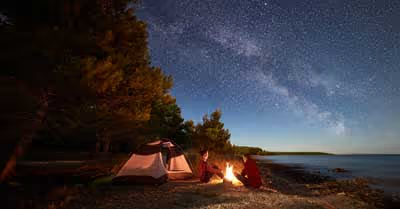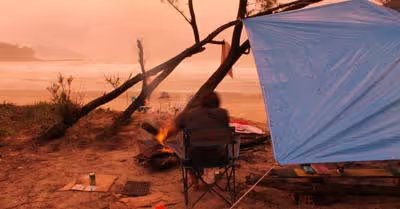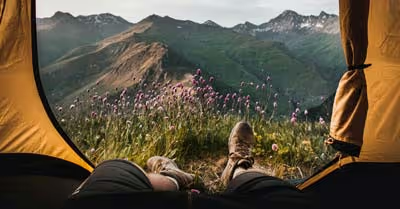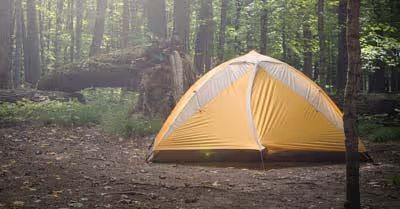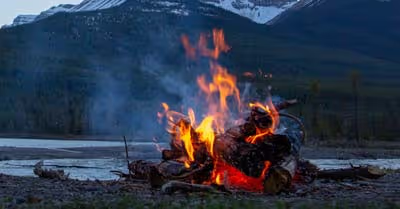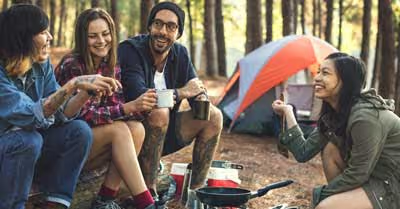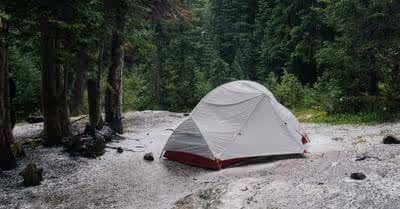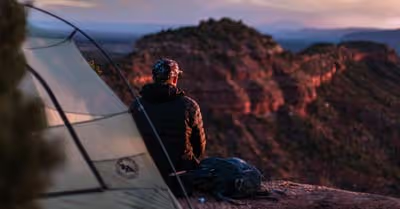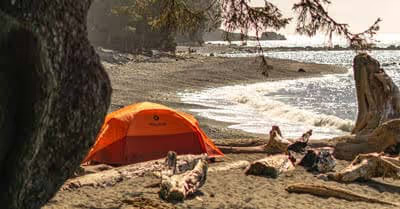Table of Contents
Step 1: Pick your camping site
Your first task should be deciding where you want to go. Do you love lakes, mountains, forests, streams? Decide on your perfect location keeping in mind the distance. As a rule of thumb, first-time campers should stick to nearby locations. You don't want to be driving or hiking an entire day just to reach a campsite. Most of the time should be spent on actual camping as opposed to traveling.
A nearby campsite is also good for safety reasons. Familiarity offers great comfort when starting out, allowing you to concentrate on the camping experience instead of wondering what might go wrong. A camping site that is close to home (an hour or two away) is ideal for starters. Even if you run out of supplies, you can restock easily.
The campsite should be fairly popular for safety reasons; however, avoid overly busy camping spots that are crowded for obvious reasons. Remember, most recreational areas require reservations. During peak season, campers are required to make a reservation if you wish to camp in a national park. If you don't know any campsites near you, you can go online, search for suitable sites on campsite directories and make a reservation. This should work for anyone regardless of your current location.
Besides location, remember to explore the uniqueness of the campsites you wish to visit. All campsites are unique. When starting out, it's important to think of what's important to you. Do you want fancy facilities, a sea view, or campfire? For starters, I'd recommend a developed camping ground with readily available amenities (like water, tables, and bathrooms) to those who need them. Once you have your camping site preferences, find camping sites near you that offer such experiences/features.
Step 2: Prepare your camping gear and clothes
Once you know where you want to camp for the first time, you can proceed and prepare your camping gear. As a first-timer, you don't need to invest heavily in gear. You don't need camping gear used by pro campers. Don't make a mistake of investing thousands of dollars before you "test the waters". Here are the basics of camping gear for first-time campers.
Choosing a tent
When picking a camping tent, focus on size. You don't need the fanciest camping tent you can find. However, you need one that will accommodate you and whoever you are camping with comfortably.
I'd recommend a camping tent that is larger than you need for extra space and comfort; otherwise, you might not like your first camping experience. If possible, borrow or rent a camping tent instead of buying one. Your first camping experience shouldn't involve significant investment. It takes experience to choose the "perfect" tent. Unless you are ready to invest in a tent, you might find it useless in the future, stick to borrowing or renting.
As mentioned above, focus on space. Camping tents are usually sold with capacity in mind. So, if you are looking to camp with your partner, get a 2-person camping tent or bigger. Remember to check the height. Ideally, you should be able to stand upright in your tent. Otherwise, you may have trouble moving around and getting dressed. It also helps to have a tent with multiple doors to allow free movement in/out of the tent without disturbing your tent-mate up.
Sleeping bag and sleeping pad
Tents aside, you'll need a sleeping bag. As a beginner, focus on the temperature rating and size. A summer bag is adequate if you are camping during fair weather; otherwise, you may need a 3-season sleeping bag when camping during unpredictable weather.
A sleeping bag may not be enough in most cases. You need a sleeping pad that works as a mattress. Besides offering more comfort, sleeping pads prevent excessive heat loss from the body. You should focus on warmth and comfort.
Lighting
Even if you are visiting a developed camping site, you'll still need your own illumination. A flashlight is a must-have when camping. While flashlights are enough, you can carry a headlamp or lantern to free your hands as you do camping tasks. If you plan to start a campfire, pack your matchsticks. However, watch for restrictions/rules on campfires first.
Stove
You'll need to cook while camping. A basic two-burner propane stove should work unless you want to cook in style, which isn't necessary for starters. Don't forget to carry fuel canisters.
Cooler
You need a cooler if you plan on cooking perishable foods. A cooler will also be handy when storing cold beverages. A basic cooler is enough for starters. If you need one that will keep perishables fresh for days, you may be required to invest in newer coolers with added insulation.
Utensils
You need plates, cups, sporks, and pots to cook and serve your meals when camping. If you have unique utensil needs for unique dishes, remember to carry them. Don't forget to carry a scrubber, towel, biodegradable soap, and a small washtub unless you plan on carrying dirty dishes back home. When packing utensils, use a large plastic bin (with a lid) for better portability.
Camping chairs
Don't forget to carry camping chairs unless you plan on sitting on the ground, which isn't pleasant over a long time. While camping chairs are optional, your experience will be more comfortable.
Toiletries
You'll also need toiletries, which includes all hygiene items as well as medication. You should also include a first-aid kit, insect repellant, sanitizer, and sunscreen if you plan on basking in the sun. Toiletries are a must-have even if your camping site offers them. Toiletries always run out. It's also good to have your own for hygienic reasons.
Clothing
Don't forget to pack the right clothes. It's always better to pack more clothes than you need. You should pack clothes that will keep you warm just in case the weather is cold. Dealing with hot weather is easier. You should pack a rain jacket in case it rains while you are camping.
Also, account for dirt when packing clothes. Getting dirty is part of camping, so carry clothes you would gladly jump into a muddy puddle in. When picking such clothes, remember to include a plastic storage bag to avoid mixing dirty and clean clothes.
To keep warm, carry a coat, gloves, beanie, warm socks, and a raincoat. Carry some outdoor shoes as well and open shoes/slippers you can wear after long hikes.
Avoid denim jeans and cotton t-shirts as cotton may make you feel sweaty in hot weather and chilly in cold and wet weather. Nylon, polyester, or merino wool materials are better at managing moisture in camping applications. These materials dry fast and are great for clothing that touches the skin i.e., t-shirts, briefs, sports bras, underwear, and socks.
Step 3: Try out your gear at home
Don't just pack everything and head out to camp. You must set up everything just to be sure you have everything. This step applies mostly to gear like tents. You need to pitch your tent in your backyard just to be sure you can do it properly and in record time.
Many newbie campers waste precious time pitching tents because they overlook this critical step. Most importantly, don't stop when you finish pitching your tent. Do the same with all your gear from the sleeping bag and pad to the toiletries. Test your sleeping bag and sleeping pad for comfort and warmth. You should also check your lanterns outdoors in the dark.
If possible, try camping for a couple of hours outdoors in your yard. You can cook a meal just to make sure you have everything, and it works as required. Camping outdoors in your yard can help you get a lot of firsthand information you wouldn't have access to as a first-time camper. Remember to try out some of your clothing i.e., jacket just to make sure it is warm enough.
Step 4: Prep your meals
Step 3 will help you know if you have carried everything. You need step 4 to make your meal preparation experience fast, easy, and enjoyable. Making camping meals from scratch is challenging. To avoid wasting time and forgetting ingredients, among other problems associated with preparing meals in unfamiliar territory, prep your meals in such a way that you'll just need to warm food when you get to camp.
You need to know what you will eat, when you will eat and how many people you will be feeding. You can go online and find the best camping eats. Select recipes that can be prepared ahead of time and/or those that aren't too complicated to prepare on a campsite. Don't forget to consider healthy foods over too much junk food.
It's important to eat healthy meals on a daily basis to maintain your immunity and energy levels. Focus on healthy meals that you would have at home but are still as great as outdoor meals.
Meal preparation doesn't have to be complicated. Just precook or pack everything you need for all the meals you intend to consume at the camping site. Account for breakfast, lunch, dinner, and snacks in-between. You can choose boxed/canned entrees coupled with side dishes or fresh food. A combination will also work depending on your preferences.
Remember to carry enough snacks. Plenty of fruits should be adequate. Juices, soda and/or water are a must-have.
If you are those people who need a cup of coffee or tea to function, remember to carry tea bags or instant coffee. You should look for food storage/handling guidelines for campers if there are any in your preferred campsite. Some campsites have food lockers to keep food safe from bears.
You may also be required to seal up all your meals when you are away from the camping site. Consider carrying a large sealable bin to make storage and transportation easier.
Step 5: Use a checklist
If you follow the above steps "to the letter", your chances of forgetting anything are slim. However, as a first-time camper, you still need a checklist. While I've covered just about everything you need to carry and do when camping for the first time, you need a detailed list to confirm you have everything before you head out.
Luckily, there's no shortage of camping checklists online. These checklists come as detailed as possible, including the tiniest essentials like cotton buds and dental floss. A checklist is the only way to ensure you don't forget anything.
It may take some time to prepare and use a checklist; however, it's worth the effort. Besides ensuring you don't forget anything, a checklist will also help you while packing and getting back home. If you don't want to forget your utensils or lamps in the forest, have a checklist for reference. You can draft one that matches your camping needs and wants using other checklists readily available online.
Use the checklist when packing your gear and other essentials into the car to/from camping. Here's a basic camping checklist you can use when packing:
Camping Checklist
Important Camping items
- TentSleeping bag/s
- Sleeping pad/s
- Camping pillow/s
- Headlamp/s, lantern and/or flashlight/s (with extra batteries)
- Camping chairs
- Camping table
Optional items
- Sleeping bag liner/s
- Camp rug
- Tablecloth & clips/tape
- Clothing line
- Firewood (can be sourced near campsite)
- Sunshade or screen house
Kitchen items
- Drinking water
- Matches/light
- Cooking pots
- Frying pan
- Cooking and eating utensils
- Knife
- Plates/bowls & mugs/cups
- Cooler
- Cutting/chopping board
- Washing bin
- Biodegradable soap
- Pot scrubber
- Dish towel
- Trash bags
Optional kitchen items
- Camp grill & fuel
- Charcoal
- Grill rack
- Griddle
- Dutch oven
- Portable coffee/tea maker
- Roasting folks
- Food containers, foil and/or bags
- Water jugs
Camping site extras
To enhance your camping experience, you may be required to carry the following:
- Solar or portable power
- Notebook & pen/pencil
- Music player
- Games & toys
- Storage bins
- Navigation tools
- Field guide
- Books/reading material
- Binoculars
Clothing and footwear
- Moisture-wicking undergarments
- Quick drying pants/shorts
- Lightweight jacket
- Outdoor shoes/boots
- Sleepwear
- Socks (preferable woolen or synthetic)
- Sandals
- Long-sleeve shirts (to protect against bugs and sun)
- Rainwear (pants and jacket - optional)
- Swimsuit (optional)
Hygiene and health essentials
- Toilet paper
- Toothbrush and toothpaste
- Hand sanitizer
- Toiletry kit
- Quick-dry towel
- Sanitary products
- Brush/comb
- Prescription medication
- First aid kit
- Sunscreen
- Sunglasses
- Sun hat
- Mirror (optional)
- Antiseptic wipes (optional)
- Cosmetics (optional)
- Earbuds (optional)
Step 6: Check the weather forecast
Check the forecast before you go camping just to be sure what to expect. Besides ensuring you pack what you need, weather forecasts are important for safety reasons. For instance, it's not advisable to drive, let alone camp during a storm or harsh weather. If your camping dates coincide with bad weather, you should move your trip to other dates with favorable weather.
While seasoned campers can tackle just about any eventuality, first-timers need the weather to be on their side.
Step 7: Keep time, follow the rules, and enjoy!
You should be ready for your first camping experience at this stage. When it's time to go camping, keep time. Plan for everything, including traffic delays, to ensure you arrive at your campsite on time. It's advisable to arrive early for several reasons. First and foremost, you'll get an opportunity to choose the best camping ground. You'll also have enough time to pitch your tent and relax or engage in any other task.
Getting late can trigger undesirable events that ruin your entire experience. For instance, you can get lost or miss the best tent pitching spots. You could also miss opportunities to explore the camping site and neighboring environs. Learning your way around the camping site ensures you get the best out of the experience.
It's also good camping etiquette to keep time. You should be cautious of other campers and support staff like guides who take their time to help. Arriving at night and stumbling around is a quick way of annoying other campers and guides.
Follow the rules
As a first time camper, it's critical that you follow the rules that apply to your camping site. Camping rules are set for the good of everyone. While camping may be free and liberating, you must be mindful of other campers. Most camping grounds have rules on quiet time, pollution/littering, arrival/departure, cleanliness, camping with kids, kindness, and respect towards other campers, etc.
You should adhere to quiet times, if any, respect your neighbor's space, dispose of waste accordingly, keep time, adhere to speed limits within the campsite, and mind your kids. It might take some time to get used to camping rules as a beginner; however, most rules are common sense. If you are a decent person who is respectful of others and nature, the rules shouldn't be a problem.
Have fun
Last but not least, don't forget to enjoy your first camping experience. The whole point of camping is to relieve stress, enjoy nature, and spend time with loved ones. Don't overburden yourself with rules and worry that you forget to have fun. You should be deliberate about having a memorable experience.
The above information answers the most important aspects of how to camp for the first time. Don't focus too much on what isn't covered here. I've used the above guide for years, and to say the least, I've never compromised my camping experience or missed anything major. If it's not covered above, it probably isn't a matter of "life-and-death" when camping for the first time.
In case you forget anything after going through the above guide, you can always improvise. You can even rush for items you discover you need if you follow step 1 and choose a camping site that is nearby. You can also modify the guide to match your preferences. For instance, if you are not sure about camping in a tent after step 3 (trying out the tent and gear at home), you can consider going to camp with an RV.
RV camping offers notable advantages. For instance, you can bring the comfort of your home to the campsite. You also have options to sleep outside in a tent or in your RV. However, you should be willing to spend more.
How to camp for the first time with kids
Given the uncertainties and potential risks that can come with first-time camping experiences, it's important to go for your first time camping experience with adults, not kids. You need to prepare more when taking your kids anywhere, let alone a camping site. Furthermore, some campsites don't allow kids, so it's important to do your homework.
After going the first time with adults, you'll be able to decide if you can handle camping with your kids.
Recent Articles



